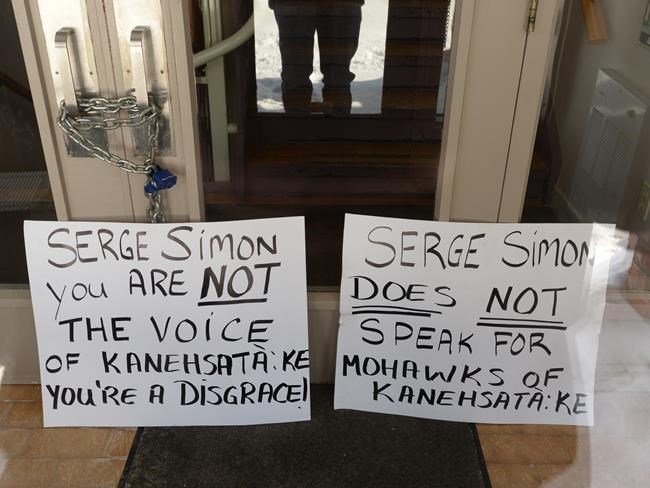
The doors of the Kanesatake Mohawk band council office are padlocked in Kanesatake, Que., on Wednesday, Feb. 19, 2020 as Kanesatake Mohawks protest after comments by their grand chief regarding rail blockades. THE CANADIAN PRESS/Ryan Remiorz
Republished February 19, 2020 - 12:22 PM
Original Publication Date February 19, 2020 - 10:26 AM
KANESATAKE, Que. - An Indigenous leader in Quebec retracted comments Wednesday about the possibility of ongoing rail blockades coming down — words that didn't go over well with members of his own community.
Kanesatake Grand Chief Serge Otsi Simon drew the ire of some community members when he suggested this week that the blockades have had their intended impact and should be lifted, at least temporarily.
"Bringing down the blockades doesn't mean that you surrender," Simon said Tuesday in Ottawa. "But it would show compassion along with the strength."
Just one day later, Simon told reporters it wasn't his place to make such comments, and he will let people on the ground decide what to do. The about-face came after discussions with a small group of community members who were upset with Simon's initial stance and began blocking access to Kanesatake band council offices Tuesday afternoon.
"After listening to criticism from my people and others, and after seeing how my recent remarks have been used by some — including in the media — in the service of trying to divide and conquer Indigenous Peoples across Canada, I wish to retract my comments yesterday about whether it is time for the blockade to come down," Simon said in a statement.
He told reporters there was a lot of "misunderstanding about the intent of what I was trying to do" by saying the blockade objectives had been met.
"Clearly they were not, so I made an error I guess in trying to bring some form of good faith. Maybe it wasn't the right timing, not yet," Simon told reporters in Kanesatake. "There's still some things that need to be done, the RCMP must be withdrawn from Wet'suwet'en Nation and let the talks begin with the feds and that nation."
The nationwide blockades have been erected in solidarity with the hereditary chiefs of the Wet'suwet'en First Nation in northern British Columbia, who oppose the construction of a natural gas pipeline through their traditional territory.
In the Montreal area on Wednesday, a new blockade forced the cancellation of commuter rail service linking the suburb of Mont St-Hilaire to the city.
The blockade was erected at the CN tracks in St. Lambert, south of Montreal, around noon.
Protesters said in a statement they are acting in solidarity with the Wet'suwet'en and will remain in place until the RCMP leaves their territory.
In Kanesatake, the doors to the office remained chained Wednesday as Simon read from a prepared statement. He said he hoped to regain access later in the day and would pursue discussions with community members.
"We have some internal healing to be done and I'm hoping my statement I made today is going to be a start in that direction," Simon said.
The community northwest of Montreal was the site of the Oka Crisis, a tense 78-day standoff over disputed woods between the town of Oka and Kanesatake in the summer of 1990.
Asked about Quebec Premier Francois Legault's comments on co-ordinated police action becoming necessary if the blockades don't come down soon, Simon urged the premier to reconsider.
Legault "fancies himself a business man," Simon said. "If the eyes of the international community are on Canada right now — and Quebec — I don't think it makes good financial sense to take that approach at this time."
-by Sidhartha Banerjee in Montreal
This report from The Canadian Press was first published Feb. 19, 2020.
News from © The Canadian Press, 2020